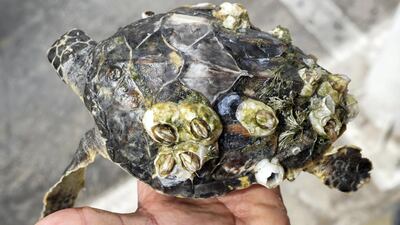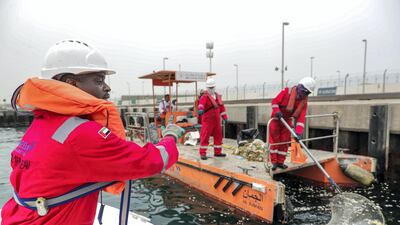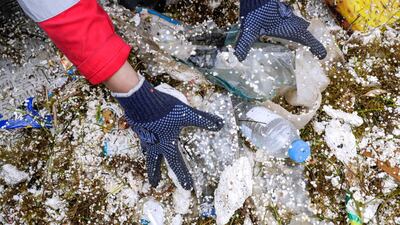At the wheel of a speedboat surging through the waters of Mina Zayed, Capt Saleh Ba Abbad is a man on a mission.
As head of the oil-spill response team at Abu Dhabi Ports, he is responsible for ensuring the pristine waters of 10 ports across the emirate are kept that way.
“I am like the falcon of the sea,” he says with a grin, his eyes scanning the horizon.
Capt Abbad started working at the ports in 1995 and the response team was established in 2006 to tackle pollution in the waters.
“Before you could see a lot of debris. But after my section came it all changed,” he says. “Now look out. It is much better. It is all clean.”
Ship movements in a single day at Mina Zayed can include several huge cruise ships, trawlers, commercial boats and vessels heading into the drydock. One oil spill could pollute the sea, harm marine life and disrupt business.
The National spent a morning with Capt Abbad and his team to see how they are fighting back against pollution – and even releasing rescued turtles back into the sea.
Abandoned fishing nets, discarded plastic, dumped timber and waste from tankers, oil spills and rescuing injured animals are just some of the issues they must deal with. The team collected a staggering 120 tonnes of floating sea debris across all 10 ports last year alone. At least 10 tonnes was recycled.
A specialised boat, similar to a catamaran, allows workers to skim debris from the surface of the water and is vital to the operation. Two workers use large nets to retrieve plastic water bottles, styrofoam pellets and other rubbish that has been dumped. They can also dispatch sub-aqua divers into the sea to scan for underwater pollution.
Capt Abbad's team is comprised of 14 people, five speedboats and the debris boat. The speedboats can carry the team 83 kilometres per hour and they are used chiefly to target oil spills. The team gets daily reports from the ports, conducts patrols, monitors satellites and responds to any warnings of debris in the waters. Their work stretches from Khalifa Port to the east all the way west to Sila'a port on the Saudi border. There is someone on duty at all times, while Capt Abbad is on call 24-hours a day.
Over the past two months, three turtles were found dead while four were rescued and released back into the water. Capt Abbad has seen turtles suffocated by plastic or killed when boats crash into them. Abandoned nets are also a huge problem. “Some fisherman do not have that awareness,” he says. “They [can trap] turtles and leave them there.”
When they get trapped and cannot swim around, barnacles can attach themselves to their shells and they are unable to swim and can die. So the team takes the turtle, cleans the shell and returns it to the water.
Capt Abbad had to confront a major oil spill in Mussaffah last year. Thousands of litres had been dumped into manholes, entered the sewerage network and the sea. He went straight the source, set up five plastic 100-metre booms – structures which float on the sea and contain the spill – to stop it spreading and the oil was tackled with skimmers.
“In just two hours the oil could reach the Corniche,” he says. “But God gave me a chance and we stopped it.”
Companies found guilty of causing oil spills face fines of up to at least Dh1 millon and individuals caught throwing rubbish can be slapped with fines of thousands of dirhams.
Capt Abbad, now in his 40s, is from Abu Dhabi. He was in the army before the port posting and is one of those unsung heroes of the emirate. He drives a Toyota pick-up and, back on the quayside, recalls how the late President, Sheikh Zayed, used to just turn up and drive around Mina Zayed unannounced.
"If there was a problem – he would say 'what do you need and I'll give you support'. He loved the sea and the desert. He liked all people – Pakistani, English, anywhere no problem. I never saw him angry."
The oil response team is run by Safeen, which is in charge of marine services at the ports. About half of his team are Emirati with the rest from the Philippines, Pakistan, Ghana and Yemen and there are plans to expand it.
“I love the job,” he says. “We help the environment and help the animals. Animals and humans are the same. Forget Muslim and Christian, we are all the same.”





